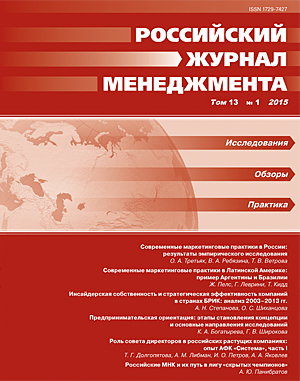Insider Ownership and Firm Performance: Evidence from BRICS countries
in 2003–2013
Abstract
In this paper we study the influence of insider ownership on firm performance in emerging capital markets of BRICS countries in 2003–2013. We adjusted the classic model of firm performance proposed by Morck, Shleifer, and Vishny (1988) for the inefficient emerging capital markets. To modify the classic model we, first, apply the concept of investor protection rights developed by La Porta (2002) and, second, introduce additional factors controlling the growth rates and risk level. We test two specifications, linear and cubic, of the modified model for the sample of 97 nonfinancial companies in Brazil, Russia, India and China. The results demonstrate that the insider ownership increases the firm performance at low and high levels of insider ownership illustrating the “convergence of interests” hypothesis. When insiders own medium-size blocks of company’s shares (23,2–61,3%), the insider ownership decreases the corporate performance, thus illustrating the “entrenchment effect”. Finally, we demonstrate that the entrenchment effect became stronger in times of global financial crisis of 2008–2009.
Keywords:
ownership structure, insider ownership, firm performance, corporate governance
Downloads
References
The List of References in Cyrillic Transliterated into Latin Alphabet
Downloads
Published
How to Cite
Issue
Section
License
Articles of the Russian Management Journal are open access distributed under the terms of the License Agreement with Saint Petersburg State University, which permits to the authors unrestricted distribution and self-archiving free of charge.





